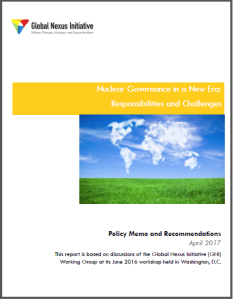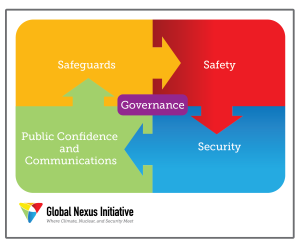
Evolving Nuclear Governance for a New Era
Findings and Recommendations
The following findings and recommendations are based on the Global Nexus Initiative’s June 2016 workshop on Nuclear Governance in a New Era: Challenges and Responsibilities.
Finding I: The Nuclear Governance System Must Effectively Respond to New Challenges
The global nuclear governance system is facing a series of new challenges that require effective responses. As the number of nuclear reactors grows worldwide, in response to the need for carbon-free energy and to meet national energy demands, the governance system will be taxed with ensuring the safety and security of a larger number of nuclear plants and materials. The nuclear supplier situation is in flux, with South Korea and soon China joining Russia in aggressively pursuing market share. They are offering operational and financing support that is particularly attractive to newcomer nuclear nations.
But the challenges are growing. Cyber security threats are evolving rapidly and threaten all aspects of critical infrastructure, including the energy sector. And, the international nuclear security system continues to lag behind the nuclear safety and nonproliferation regimes in terms of transparency, comprehensiveness and effectiveness. As new countries pursue nuclear power and others seek to expand it, they must ensure that strong institutional, regulatory, managerial and educational systems are in place. These are particularly significant tasks for newcomer nuclear states as these issues already have proven to be challenges even in nations with a well-developed and long-standing nuclear infrastructure.
Recommendations
- A key nuclear governance principle that needs to be established and widely accepted is “realistic continuous improvement”. This means that the system requires regularized attention to identify gaps and weaknesses and that actions should be taken on a rolling basis to address these issues and new challenges that may arise. Continuous improvement requires identifying problems and challenges and addressing them proactively, not in response to an incident. The emphasis on realistic improvement is to ensure that all actions taken positively impact nuclear operations and strengthens the system against known and potential dangers. The goal is to strengthen weak links, improve safety and security culture, but not impede operations and progress.
- The nuclear security regime, in particular, needs to be strengthened and universalized along with the nuclear safety and safeguards systems. For nuclear security this will require a move toward common standards, greater transparency of non-sensitive information, expansion of peer reviews, sharing of best practices and consideration of an international agreement on nuclear security. The safeguards regime has been strengthened by the introduction of the Additional Protocol that grants the IAEA the authority to verify a state’s safeguards obligations including at undeclared facilities. But, there are still nations that have not brought it into force. There should not be complacency with the existing nuclear safety system and improvements should continually be sought. The Convention on Nuclear Safety requires peer reviews, for example, but does not have an enforcement mechanism. The IAEA’s international safety standards are non-binding and it does not have the authority to conduct an inspection without an invitation from the Member State.
Finding II: Improving Nuclear Governance Requires a New Strategic Alliance
The improvement of nuclear governance cannot effectively be done by any one stakeholder community in isolation or by any institution alone. It requires a strong coalition among governments, the nuclear industry and its professional associations, and the nuclear nonproliferation, security and safety expert communities. Together, and in collaboration with relevant international organizations, they can assess the requirements for improvement and formulate balanced and needed advances in the system. This integrated approach to strengthening the nuclear governance system can improve the chances that the necessary changes will be made, that they will not have unintended impacts, and that they will advance global safety and security. The foundation for this strategic alliance has been created but significant additional work is required to institutionalize it and overcome past divisions (real and artificial) between these communities. An important part of that effort is the need to improve communication on nuclear governance issues and messaging effectively on its value.
Recommendations
- Initiatives that have begun to create strong strategic alliances among the key nuclear governance stakeholder communities should be expanded, strengthened and institutionalized. The Global Nexus Initiative is one example of this new approach that has brought the nuclear industry and civil society into closer collaboration. Another example is the Nuclear Industry Steering Group for Security (NISGS). This is an industry initiative that seeks to continue the role that nuclear companies played during the Nuclear Security Summits and strengthen its relationship with governments and the IAEA. The NISGS should create an opportunity for regularized collaboration with non-governmental experts on nuclear security issues and the expert community should organize itself to effectively interact with this group. Additional initiatives that can further strengthen these relationships should be developed and supported.
- The development of effective and approachable communication and messaging on the importance of nuclear governance and its improvement requires more attention and honing to increase its salience and value. A key part of the strategy for improving nuclear governance is the ability to communicate effectively to the public and all stakeholders on the value of steps being taken to continually strengthen the management and oversight of nuclear operations. The nuclear landscape is highly technical, and in general, the global public is not knowledgeable about the in-depth aspects of its operations.
Finding III: The Evolution of Nuclear Suppliers is Challenging International Standards
The nuclear supplier landscape is evolving rapidly, with Russia, South Korea, and soon China, aggressively marketing their technology and services. Traditional suppliers, including the United States, France, and Japan are at risk of largely becoming sub-contractors in new nuclear reactor builds. This raises questions about how effectively the existing nuclear governance system will be implemented and where the impetus for improvement will originate. The major nuclear states of the West have played a significant role in the development of the existing regimes. However, traditional leading suppliers, including U.S.-based Westinghouse and France’s AREVA are currently facing significant financial problems. If the involvement of previously dominant suppliers declines, their ability to drive international governance implementation and improvement will also be reduced. The emerging suppliers do not have a deep record of initiating or recommending major improvements to the global nuclear governance system. But, to be viewed as responsible suppliers, they must become more active in this process[i]. The Nuclear Power Plant Exporters’ Principles of Conduct was designed to enhance national and international governance and oversight of nuclear exports. It has included support from major companies from the U.S., Japan, France, South Korea, Argentina, and Russia. No organization from China agreed to participate in the initiative. Unfortunately participation in the Principles of Conduct is waning and continuation of this effort is unlikely.
Recommendations
- The emerging nuclear suppliers must demonstrate an enduring commitment to protecting and instituting existing norms and exhibit a willingness to take leadership in initiating improvements in the nuclear governance system.
- Existing suppliers, particularly in the U.S., Japan, and Europe, must maintain strong influence in ensuring that existing norms are maintained and are not compromised. They also must retain adequate influence to continue to move the supplier norms in a positive direction. Achieving these objectives will be easier and more effective if these countries maintain active nuclear programs and continue active engagement with international partners on technology and regulatory development.
- There needs to be a greater appreciation for the impact that nuclear supply has on the political and strategic objectives of the recipient and supplier nations. A cooperative relationship must be created that can last for up to 100 years to encompass the full term of reactor building, operation, and decommissioning. Ignoring the geopolitical implications of this relationship can impact a range of foreign policy, security, and economic interests of various nations, including the ability to strengthen the nuclear governance system.
Finding IV: Nuclear Newcomers Require a More Effective Nuclear Governance System
The locus of nuclear activity is moving from established nuclear nations to developing countries and newcomer states. These are regions where political tensions and security risks are high, including in the Middle East and South East Asia. The new wave of nuclear operating states, in general, exhibit weaker rule of law, less regulatory independence, and decreased nuclear technical and training depth. From the perspective of climate change, some assessments have identified a requirement for 4,000 Gigawatts of nuclear power worldwide. Depending on the size of each unit this could be 2,000-4,000 reactors. While, it is unlikely that there will be several thousand new Light Water Reactors (LWRs) deployed to meet atmospheric carbon reductions, the combination of LWRs and advanced reactors could combine to double or more the current number of reactors worldwide to over 1,000. Advanced reactors in particular may have an appeal for developing economy nations because of their ability to provide distributed power and the possible ease of deployment. This growth will place a significant strain on the existing governance system and little has been done to think through the requirements of a system that would be essential for the safe and secure operation of a fleet of reactors of this size and one that includes traditional light-water and advanced technologies.
Recommendations
- Additional assistance from the experienced nuclear operating states is required to support newcomer nuclear nations in preparing for and effectively and safely operating nuclear power installations. This task should be shared with the International Atomic Energy Agency, which is already very active in this area. A clear focus must be on assessing the needs of the nuclear newcomers in order to establish the regimes required to ensure the safe, secure, and proliferation-resistant operation of any plant.
- Nations deploying significant additional nuclear power reactors and those developing advanced reactors, in cooperation with the IAEA, need to address in greater detail how the nuclear governance system will adapt to a potential significant increase in the number of reactors worldwide and the multi-technology environment that may develop by mid-century.


